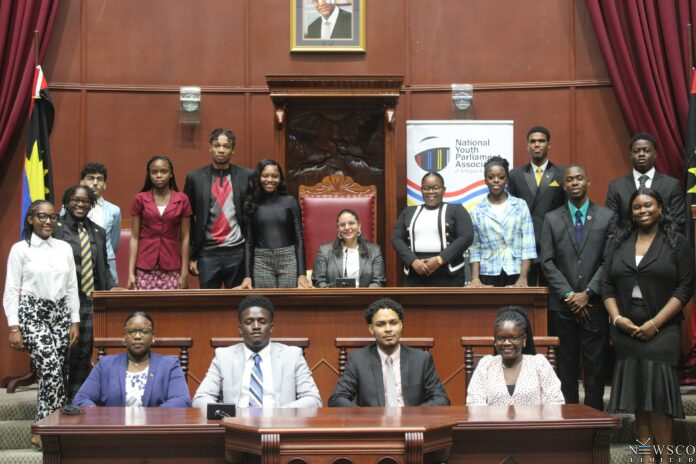By Robert A. Emmanuel
Members of the National Youth Parliament Association of Antigua and Barbuda (NYPAAB) held a parliamentary debate last week Friday, seeking to raise awareness on the importance of healthy eating through a discussion on increasing taxes on sugary foods.
The NYPAAB is a registered non-profit organisation whose main aim is to give youth a platform to not only debate issues facing youth in Antigua and Barbuda but also training them to become future community leaders.
On Friday, the debate was led by Shaquan O’Neil, who along with fellow Youth Parliamentarian Esquire Henry proposed the bill.
O’Neil who was the Youth MP for St George and Prime Minister for the debate, spoke about some of the actions the NYPAAB hoped to execute in connection with their proposal to address the rise in non-communicable diseases (NCDs) among youth.
“Within the Caribbean, the two pressing issues are climate change and non-communicable diseases…the reality is that the high consumption of sugar sometimes leads individuals to the state of diabetes or hypertension,” he said.
For the purpose of the debate, the youth parliamentarians defined sugary foods as any food with a sucrose level above 20 percent, including high fructose corn syrup, jams, certain breakfast cereals and jellies, and sodas.
Part of the action plan proposed by the youth parliamentarians would be to engage students in schools about the importance of healthy foods, providing a dietary chart for youth to use as a guide.
Youth MP for All Saints East and St Luke Amelia Williams also spoke of how children are often given unhealthy foods such as KFC which increases their chances of contracting NCDs.
“I come from a family with a history of diabetes, a preventative disease that many Antiguans and Barbudans suffer from.
“[Diabetes, obesity and cardio-vascular diseases] decrease an individual’s quality of life but also adds significant burden on the healthcare system,” Williams argued.
Speaking more about his action plan, O’Neil said that the agricultural programmes in schools need to be better supported so that students could not only grow their own produce but use them as part of a breakfast programme catered to less fortunate youth.
He added that there needs to be a day focused solely on local businesspeople who produce healthy foods and drinks within schools, indirectly supporting the local economy.
“How about we create a breakfast programme for secondary school students…and the way we tend to do it, we want to help the schools to get the necessary tools and materials to continue their agricultural curriculum,” he said.
Chrysean Jarvis, Youth MP for St John’s Rural South showcased his own blend of a natural eddo drink as an example of how youth can become entrepreneurs through the provision of healthy drinks.
Meanwhile, O’Neil also spoke about the need for gym membership, calling for an initiative to encourage secondary school students to attend gyms on the island.
Nathalie Murray who represented St John’s City East in the debate also highlighted the importance of exercise.
“In the schools, I have seen children buy breakfast and there is not even a cup of tea or some fruit with their breakfast.
“When they walk out of the cafeteria with their breakfast or buying from a vendor at the fence, you would literally see the grease on the paper bag and allong with that is a bottle of soda.
“Yes, the schools have physical education and health and nutrition as subjects, but the question is: how many students are actually putting what they learned in school to be part of their lives?
“Going to the gym or even taking a 30-minute walk or run around your village…can be a form of exercise; I would love to see more young people taking control of their lives and their diet,” Murray stated.
Youth MP for St Mary’s South, Esther McKenzie spoke personally about the impact of NCDs and why it was vital for youth to care about the issue.
“As Antiguans and Barbudans, it is imperative for us to know that if certain foods do not cater our energy needs, then they should not be consumed; foods such as canned honey, canned fruits and all other foods highlighted.”
However, representing St John’s Rural East was Leader of the Opposition Rainer Santos Mercado who proposed a tax increase on unhealthy food may not be the best way to address the issue, but argued that an educational campaign with videos featuring politicians, physical therapists and other advocates of healthy lifestyle would better serve to encourage healthy eating.
Fellow opposition members, Kaiesha Joseph, representing St John’s City West, and Jonathan Wehner, representing St Philip’s South highlighted that healthy foods subsidies making them more affordable to the Antiguan and Barbudan populace should have been the focus.
They also noted that increasing the cost of certain goods on Antiguans and Barbudans would not solve the problem.
The debate was well attended by members of the Antigua and Barbuda Electoral Commission, the United Progressive Party, the Department of Youth Affairs, staff at the Parliament, Regis Burton and other officials who keenly listened to their contributions.


